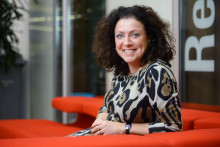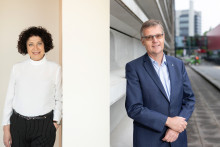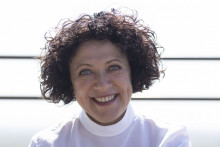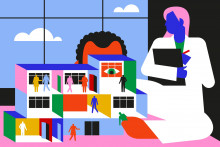Why is your group hosting this event?
Bondarouk: ‘We want to pay attention to the Dutch national Diversity Day, since we believe that even small actions towards inclusion are beneficial to organisations and society. We were not involved in setting up this national Diversity Day. If that were the case, I would have pleaded to use the word inclusion and not diversity.’
How come?
‘We are already diverse. Let’s take the next step to include everybody and to not offend anyone. So I think it’s all about inclusion, especially within the academic community where everyone is even more different than a typical company.’
How is the UT doing in that regard?
‘I think the university is taking right steps, but it comes down to a mindsets of all of us to include everyone, and how you would set up your organisation to facilitate that. The HR department has people that work on inclusiveness policies. Some Dutch universities have set up an entire unit aimed at inclusion & diversity. I’m not saying that one is better than the other, but it’s about raising a profile and being visible.’
Do you have any examples of that?
‘Why not look more critical at how vacancy texts are written down? More often than not, they seem to be aimed at strong male candidates, with phrases as ‘we’re looking for excellent young candidates with ambition and publications in top journals’. This kind of phrasing apparently isn’t that appealing to female candidates, we found. I also see that the UT community is jumping through all kinds of hoops to give international students some sort of special treatment. Why make them feel so special? It makes them feel different, which is the opposite of inclusion. The diversity and inclusion discussion is always a sensitive one, that – if not carefully addressed- may result in stigmatisation and focus on just one aspect. People forget about the big inclusion picture when they solely focus on specifics like gender or nationality equality.’
Still, your own event is also called ‘Diversity Snacks & Drinks’ and not ‘Inclusion Snacks and Drinks’…
‘And we also invited the FFNT, the Ambassadors Network and the newly founded Pride platform. I admit it’s always a catch-22 when you organise these events. If you make the topic too broad, you won’t attract any attention. If you narrow it down too much, you risk that people feel excluded. In hindsight, we should have used the word inclusion. We want everyone to feel welcome, even if you don’t feel strongly about the topic. Inclusion is about being yourself.’
And the event is also a good way to commemorate the 30-year anniversary of the HRM group?
‘Indeed! Thirty years ago, our research was mostly focused on the social aspects of work environment. Since then, there has always been a clear focus on social innovation, and since 2004 on the technological innovation. We’ve been there from the start of electronic HRM research, and we developed to researching algorithmic management, the gig economy and hybrid teams – how people collaborate with robots in the workplace. I think there’s an interesting parallel with inclusion there, which is also a phenomenon that’s constantly innovating. I think it’s safe to say for both that the work is never done.’







